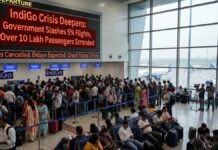
Key Points
- 112 Air India pilots took sick leave on June 16, just four days after the devastating AI-171 crash
- 275 people died in the June 12 Boeing Dreamliner crash in Ahmedabad, with only one survivor
- Government denies “mass sick reporting” but acknowledges minor increase in pilot sick leaves
- DGCA issues four show cause notices to Air India for operational violations
- Mental health support measures introduced including Peer Support Programmes for flight crew
- No compensation policy exists for civilians affected by aircraft crashes
New Delhi: The tragic crash of Air India flight AI-171 on June 12, 2025, has had far-reaching consequences beyond the immediate loss of life, with 112 pilots across Air India’s fleet reporting sick just four days after the disaster that claimed 275 lives.
Pilot Sick Leave Surge Raises Concerns
Minister of State for Civil Aviation Murlidhar Mohol confirmed in a written Lok Sabha reply that Air India experienced a notable uptick in pilot sick leave requests following the crash. On June 16, 2025, the breakdown of pilots who reported sick was:
| Pilot Category | Number |
|---|---|
| Commanders (P1) | 51 |
| First Officers (P2) | 61 |
| Total | 112 |
While Mohol denied any instance of “mass sick reporting,” he acknowledged this represented a minor increase compared to normal patterns across all Air India fleets.
The Devastating AI-171 Crash
The London-bound Air India Boeing 787-8 Dreamliner crashed into a medical college complex shortly after takeoff from Ahmedabad’s Sardar Vallabhbhai Patel International Airport. The aircraft was carrying 242 passengers and crew, including former Gujarat Chief Minister Vijay Rupani.
Casualty Breakdown
- 275 total fatalities: 120 men, 124 women, and 16 children
- One survivor: Indian-origin British national Vishwash Kumar Ramesh
- Ramesh’s brother Ajay Kumar Rakesh (45) was among the victims
The preliminary report from the Aircraft Accident Investigation Bureau (AAIB) identified fuel supply cut-off to engines as the critical factor in the crash, though many questions remain unanswered.
Mental Health Support Measures
Existing Framework
Recognizing the psychological impact on aviation personnel, the government has implemented several mental health initiatives:
February 2023 Directives:
- Airlines required to ensure “quick and effective methods to assess mental health” during medical examinations
- Introduction of “standalone and customised training capsules” for flight crew and air traffic controllers
Peer Support Programme (PSP):
- Mandatory for all scheduled and non-scheduled operators, Flight Training Organizations (FTOs), and Airports Authority of India (AAI)
- Proactive and non-punitive approach to help flight crew and air traffic controllers recognize and overcome problems
- Designed to assist personnel in coping with mental health challenges
Regulatory Action Against Air India
The Directorate General of Civil Aviation (DGCA) issued four show cause notices to Air India on July 23, addressing violations in:
- Cabin crew rest and duty norms
- Cabin crew training rules
- Operational procedures
These notices followed voluntary disclosures made by Air India to DGCA on June 20 and 21. An Air India spokesperson acknowledged receipt of the notices, stating: “We remain committed to the safety of our crew and passengers.”
Policy Gaps Highlighted
Minister Mohol revealed a significant policy gap, confirming that no specific compensation policy exists within the civil aviation ministry for damages suffered by civilians on the ground due to aircraft crashes. This absence of ground victim compensation framework has raised concerns about preparedness for such disasters.
Industry Impact and Concerns
The surge in pilot sick leave requests highlights the broader psychological impact major aviation accidents have on industry personnel. While the government maintains this was not “mass sick reporting,” the timing just four days after the crash suggests the tragedy significantly affected pilot confidence and mental well-being across Air India’s operations.
The incident underscores the critical importance of robust mental health support systems in aviation, where personnel deal with high-stress situations and the psychological weight of passenger safety responsibilities.
The AI-171 crash represents one of India’s worst aviation disasters in recent years, with its aftermath continuing to impact the aviation industry through regulatory scrutiny, operational changes, and the urgent need for enhanced mental health support for flight crews.


















































